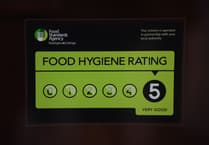Cases of the bluetongue virus (BTV-3) have been confirmed in Wales for the first time in 2025, with infections detected at two locations, including one in Powys.
The Powys case was confirmed at Presteigne on Friday following a non-negative post-movement test in a bovine. The other Welsh case was reported on the same day in a suckler cow in Chepstow, Monmouthshire. Until now, all 78 cases in the UK this year had been confined to England.
Bluetongue virus affects cattle, sheep and other ruminants, and is spread by biting midges. Infected animals can develop ulcers or sores around the mouth and face, have difficulties swallowing and breathing, experience fever and lameness, and may suffer foetal deformities or stillbirths. While the disease poses no risk to humans or food safety, it can have serious consequences for livestock health.
Since July 1, England has been designated a restricted zone, preventing the movement of livestock from affected areas into Wales.
The total number of BTV-3 cases in Great Britain for the 2025–26 vector season now stands at 80, with two in Wales.
Bluetongue is notifiable disease, so anyone suspecting their animals may have it must report it to the Animal and Plant Health Agency (APHA).
A Welsh Government spokesperson said: "We've been working hard to keep Bluetongue out of Wales and it's been nearly a year since our last confirmed case. We are keeping our Bluetongue policy under regular review based on emerging evidence.
"We urge livestock keepers to continue to be vigilant, follow stringent biosecurity measures and to practice safe sourcing of livestock. Equally, we encourage livestock keepers to talk with their vet about Bluetongue, including vaccination, and to report suspect cases to APHA."
Welsh Conservative Shadow Cabinet Secretary for Rural Affairs, Samuel Kurtz MS said the news was "deeply concerning" for farming communities.
"This disease poses a serious risk to animal health, and it is essential that farmers and the wider agricultural sector remain vigilant," he said.
“Vaccination remains our best defence, and I would urge farmers to continue to protect their herds and flocks."
He continued: “The impact of the current restrictions on livestock movements has already led to significant financial losses at our markets and for the wider supply chain. Our farmers, who work tirelessly to put food on our tables, cannot be left to shoulder these costs alone. I am pressing the Welsh Government to step up urgently with a package of financial support to help farmers and the wider sector weather this difficult period.
“Now is the time for practical action and for government to stand alongside our farmers.”
One case of bluetongue serotype 8 (BTV-8) was also confirmed in a single sheep in Cornwall last week following reports of suspicious clinical signs. Movements on or off the premises will be traced and tested. This is the first case of BTV-8 in the UK since 2008.
Both BTV-3 and BTV-8 are different strains of bluetongue virus, and the impact on livestock can vary depending on a range of factors.





Comments
This article has no comments yet. Be the first to leave a comment.